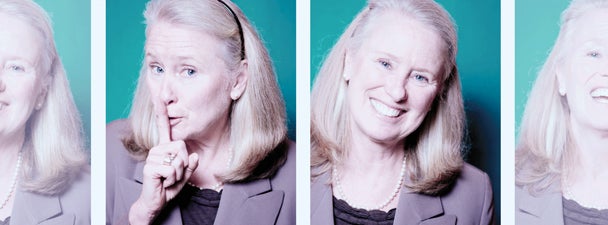
The newspaper ad asked for people with a spirit of adventure.
Mary Desjeans wasn’t so sure she had that. But she did know that she could analyze information well. The CIA, the young Notre Dame professor with a Ph.D. in Russian history figured, could use people like that. She applied. She was accepted. She said goodbye to academia and became a part of The Company.
That was 30 years ago, but she and the U.S. spy agency are still going strong, with Desjeans – the deputy director for intelligence for strategic programs – serving as one of four senior managers who oversee all aspects of the CIA’s program analysis.
For the 2010–11 school year, however, the CIA has graciously loaned her talents to the College, where Desjeans is teaching courses on national security and intelligence as a CIA scholar in residence. The program, in operation since 1985, is administered by the Center for the Study of Intelligence, which seeks to promote study, debate and understanding of the role of intelligence in American society. CIA scholars in residence have taught at more than 50 universities, including Harvard, Princeton, the University of South Carolina and the military academies.
The scholars in residence, says Desjeans, do not try to recruit their students into the CIA. Their mission is to demystify the intelligence operations of the United States and explain “the legitimate and legal role of the agency in the context of the U.S. government system.”
Desjeans, who is also an amateur Civil War historian, is quick to counter the notion that the CIA is accountable to no one and run amok with rogue agents, as Hollywood movies might have you believe. Rather, she insists, the agency is full of individuals dedicated to the protection of U.S. citizens, and secrecy is a necessary ingredient for their operations.
“There is a mystique about the CIA, but you don’t feel it when you’re inside it,” she says. “You’re not there because it’s cool. You’re there because it matters and it often dovetails with what you’re interested in.”
During much of the Cold War, Desjeans’ account at the CIA was the Soviet General Staff. While colleagues researched and wrote reports on the Soviet Union’s defense industry, Politburo, economy and more, Desjeans was responsible for keeping decision makers current on the top Soviet military officers. During the breakup of the Soviet Union, Desjeans worked 17-hour days for five months.
“It was exhilarating,” says Desjeans, who didn’t have a day off for a month after the terrorist attacks of Sept. 11, 2001, when she worked on a team that prepared the president’s daily briefing.
She shares these experiences in the hopes that students come to appreciate the threats facing our nation and how the government defends us against them – and just how critical intelligence gathering (not just by the CIA, but from all 15+ agencies in the U.S. intelligence community) is to national defense.
“It’s vital in protecting America and our allies from dangerous countries and organizations,” says Andrew Orr, a senior political science major who took Desjeans’ Intelligence and National Security Policy course last fall. “Although we mainly only hear of the intelligence failures, they have many more successes that you never hear about.”
That is, of course, unless you’re one of Desjeans’ students.




